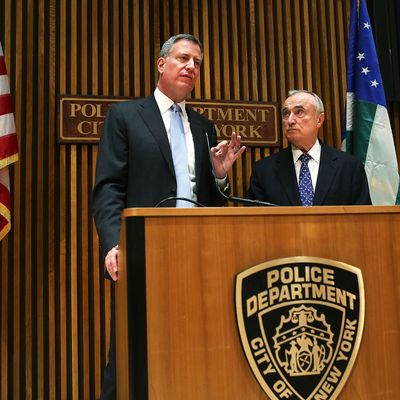
Philip Seymour Hoffman’s death couldn’t help but be big news. It became an even bigger and more riveting story, in part because of the speedy, vividly detailed accounts of his overdose: the needle still stuck in his left arm; the names and logos of the brands of heroin found in his apartment; the number of unused packets of heroin; the word-by-word texts Hoffman sent in his final hours. Great reporting. Great sources, too.
Lots of law-enforcement agencies have been involved in the Hoffman case, multiplying the possible channels of information. But the rich accounts of the actor’s overdose are also a reminder that for 12 years the NYPD spoke with one and only one voice: Ray Kelly’s. The commissioner was usually the sole police official on the podium at press conferences describing major cases. The rare unauthorized leak was dealt with swiftly and decisively: When particulars relating to the murder of Imette St. Guillen turned up in the newspapers, Kelly launched an internal investigation that combed detectives’ cell-phone records to see if they’d called reporters.
Bill Bratton has a friendlier relationship with the media, as does the commissioner’s key aide, John Miller, who has bounced back and forth between high-profile jobs in law enforcement and the press. The duo’s return to the top of the NYPD seems to have loosened lips throughout the ranks.
Last night, The Wall Street Journal broke the news that Mayor Bill de Blasio had placed a call — at midnight on Monday, says today’s Times — to a deputy chief inquiring about the arrest of a Brooklyn bishop, Orlando Findlayter, who had been an early endorser of candidate de Blasio and then a member of the mayor’s inaugural committee. De Blasio’s dubious dialing is another sign that he is still adjusting to his new reality: When he was a city councilman or the public advocate, such a call would still have been meddling, but it could have been plausibly explained as merely diligent constituent service. And few would have been paying attention, anyway. A call from the mayor carries a whole lot more weight, and registers in a lot more ears, even if it had no impact on the bishop’s quick release from custody.
The episode came as a variety of currents roil the police department. Bratton is replacing senior deputies at headquarters. Police unions have started contract discussions with the new administration, at the same time that they are in court objecting to de Blasio’s stop-and-frisk settlement. Speaking of stop-and-frisk: Even rank-and-file cops who think the tactic’s use had become excessive are troubled by what they see as de Blasio’s blanket inference that they were racist for carrying it out under Kelly.
Maybe one of the pastor’s friends — complaining about him being harassed by the cops, or bragging that Findlayter had the political hooks to be sprung — was the Journal’s tipster. Maybe de Blasio actually counts the story as a net plus: Having it known that he reached out on behalf of a black clergyman, on the same day that the mayor was enlisting dozens of them to help his push for pre-K, is in some ways good publicity. The renewed police chattiness is certainly a welcome change for reporters, and for the public, it could lead to a healthy increase in transparency. De Blasio, though, may be wondering about the thin blue line between openness and porousness.





























